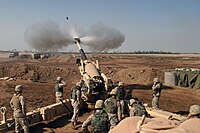
Photo from wikipedia
Aim To describe the mechanisms, burden of injury, inpatient management and rehabilitation requirements of wounded military personnel at the UK Role 4 (R4) facility within the first 12 months following… Click to show full abstract
Aim To describe the mechanisms, burden of injury, inpatient management and rehabilitation requirements of wounded military personnel at the UK Role 4 (R4) facility within the first 12 months following cessation of combat operations in Afghanistan. Methods All aeromedical evacuations were recorded prospectively between October 2014 and October 2015. Demographic, logistical and clinical data were derived manually from referring medical unit and patient movement requests in addition to host nation and R4 medical records. Results Ninety-five patients were repatriated to R4 following traumatic injury: 98.9% (n=94) were male, and median age was 27 years (IQR 25–36 years). The most common mechanisms of injury (MOIs) were sports 26.3% (n=25), falls <2 m 11.6% (n=11) and road traffic collisions 9.8% (n=9). The most common anatomical regions of injury were isolated lower limb 24.1% (n=22), isolated hand 20.0% (n=19) and polytrauma 14.7% (n=14). Median Injury Severity Score was 4 (IQR 4–9), mean 8 (range 1–41). Eleven patients (11.6%) were discharged to rehabilitation units, of whom 7 (63.6%) required neurorehabilitation. Conclusion Although service personnel sustain civilian-type injuries, the specific rehabilitation goals and shift in the acute rehabilitation requirements for military personnel must be considered in the absence of enduring combat operations. It is notable that permanent medical downgrading secondary to trauma still occurs outside of warfare. The colocation of civilian major trauma services and R4 has ensured a mutually beneficial partnership that contributes to institutional memory and improves the coordination of patient pathways. The importance of relevant resource allocation, training, support and logistical considerations remain, even during the current scale of military activity overseas.
Journal Title: Journal of the Royal Army Medical Corps
Year Published: 2018
Link to full text (if available)
Share on Social Media: Sign Up to like & get
recommendations!